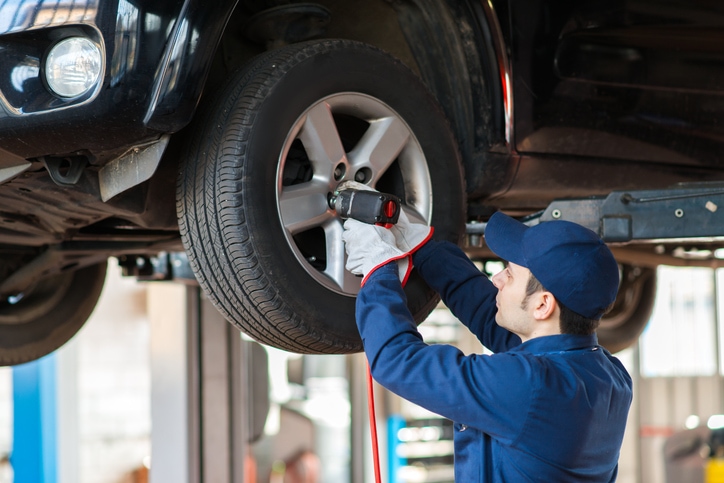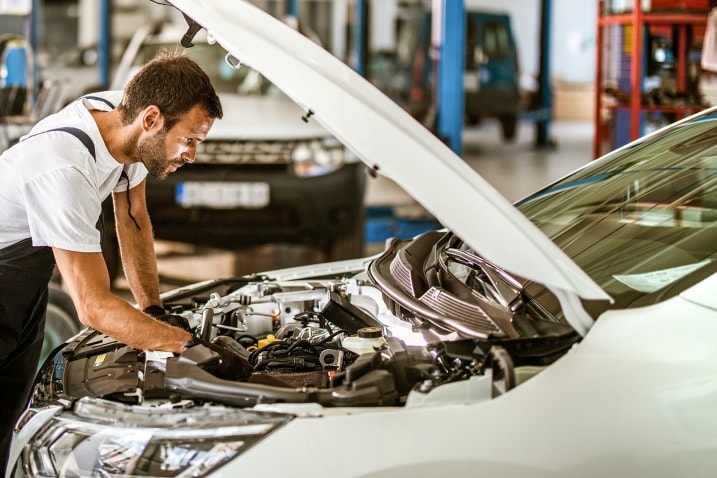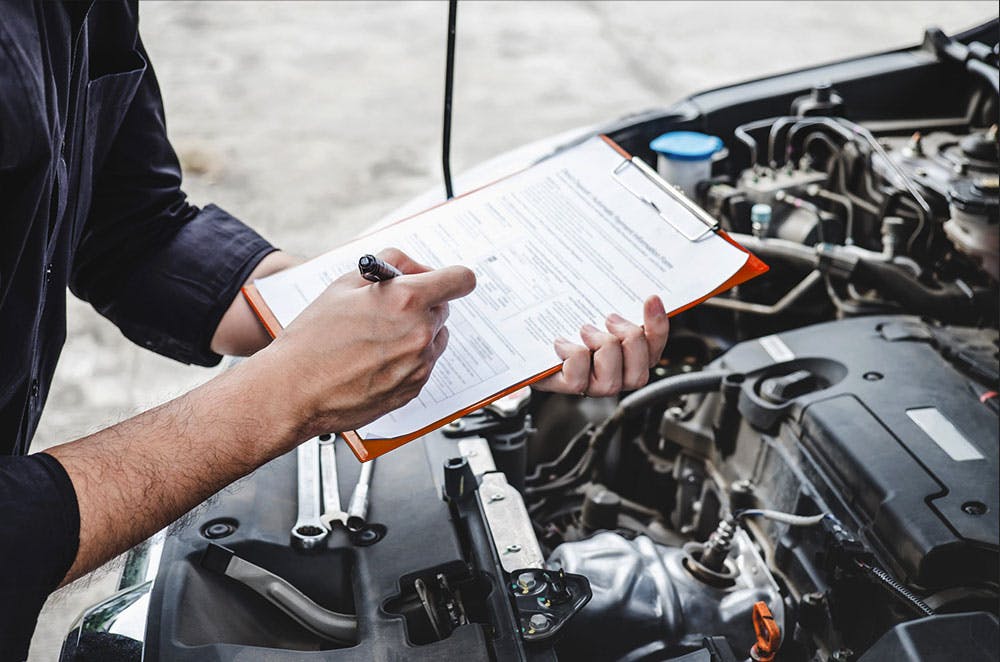All Categories
Featured
Your automobile relies on numerous liquids to keep its parts running smoothly and successfully. Recognizing the duty of each liquid and remaining aggressive in upkeep guarantees your automobile operates at its ideal.
![]()
Why It Issues: Without appropriate lubrication, engine parts can grind against each other, bring about substantial damages. Maintenance Tips: Examine your oil level month-to-month utilizing the dipstick and top off if needed. Replace the oil and filter according to your car's service schedule, usually every 3,000 to 7,500 miles depending on the oil kind and driving problems. 2. Coolant: Managing Engine Temperature. Coolant, additionally known as antifreeze, assists keep your engine's temperature within the optimal array. It prevents overheating during heat and freezing during cool problems.
Why It Matters: Inadequate or abject coolant can lead to engine overheating, which can create serious damages. Upkeep Tips: Inspect the coolant storage tank consistently and search for leaks or discoloration. Flush and refill coolant as suggested, usually every 2 to five years. 3. Brake Liquid: Trusted Stopping Power. Brake fluid is crucial for your vehicle's stopping system, transferring the pressure from your foot on the brake pedal to the brakes themselves. Over time, brake fluid can absorb wetness, which reduces its efficiency.
Why It Matters: A compromised stopping system can seriously influence your safety and security. Upkeep Tips: Examine the brake fluid tank and ensure the level stays within this array. Adjustment the liquid every a couple of years or as required. 4. Transmission Liquid: Smooth Gear Shifts. Transmission liquid lubricates the transmission elements and ensures smooth gear changes. It also avoids getting too hot by cooling down the system.
![]()
Why It Matters: Ignored transmission liquid can bring about tailor slippage, overheating, and even total transmission failure. Upkeep Tips: Screen the liquid's degree and problem regularly. Replace it according to the supplier's suggestions, commonly every 30,000 to 60,000 miles. 5. Power Guiding Fluid: Simple And Easy Maneuvering. Power guiding liquid aids in precise and smooth steering. Low or polluted fluid can make steering harder, putting strain on the system.
Why It Issues: Poor steering responsiveness can endanger your control over the vehicle. Maintenance Tips: Consistently examine the liquid degree and shade, and top it off as required. Listen to leakages or uncommon steering noises. 6. Windshield Washer Fluid: Clear Presence. While it does not influence performance, windscreen washer fluid is necessary for preserving exposure, specifically in negative problems.
![]()
Why It Matters: A tidy windscreen guarantees you can see clearly, decreasing the danger of crashes. Upkeep Tips: Refill the washer liquid tank often and use a formula matched to your environment to stop freezing or spotting. Why Normal Liquid Upkeep is Important. Optimal Performance: Appropriate fluid levels and quality make certain all systems run smoothly. Safety Guarantee: Brake and power guiding liquids straight influence your capacity to regulate the lorry. Cost Financial savings: Preventative upkeep stays clear of costly repair work by capturing prospective issues early. Longevity: Fluids in excellent problem assistance extend the life of critical parts, consisting of the engine and transmission. Quick Tips for Effective Fluid Upkeep. Follow the Handbook: Refer to your vehicle's owner manual for certain upkeep intervals. Look Out for Leaks: Pools under your vehicle can suggest liquid leakages that require immediate attention. Use Recommended Products: Adhere to fluids recommended by your automobile producer to stay clear of compatibility concerns. Take Notice Of Indication: Control panel signals or uncommon efficiency can signify liquid troubles. Verdict. Preserving your lorry's liquids is one of the most basic ways to keep it running successfully and securely. Whether it's engine oil, coolant, or brake liquid, each plays a vital role in your vehicle's total health and wellness.

- Engine Oil: The Lifeblood of Your Engine. Engine oil plays an important function in lubricating the engine's moving components, reducing friction, and shielding versus wear and getting too hot. In time, oil comes to be or deteriorates polluted with particles, which can compromise its efficiency.
Why It Issues: Without appropriate lubrication, engine parts can grind against each other, bring about substantial damages. Maintenance Tips: Examine your oil level month-to-month utilizing the dipstick and top off if needed. Replace the oil and filter according to your car's service schedule, usually every 3,000 to 7,500 miles depending on the oil kind and driving problems. 2. Coolant: Managing Engine Temperature. Coolant, additionally known as antifreeze, assists keep your engine's temperature within the optimal array. It prevents overheating during heat and freezing during cool problems.
Why It Matters: Inadequate or abject coolant can lead to engine overheating, which can create serious damages. Upkeep Tips: Inspect the coolant storage tank consistently and search for leaks or discoloration. Flush and refill coolant as suggested, usually every 2 to five years. 3. Brake Liquid: Trusted Stopping Power. Brake fluid is crucial for your vehicle's stopping system, transferring the pressure from your foot on the brake pedal to the brakes themselves. Over time, brake fluid can absorb wetness, which reduces its efficiency.
Why It Matters: A compromised stopping system can seriously influence your safety and security. Upkeep Tips: Examine the brake fluid tank and ensure the level stays within this array. Adjustment the liquid every a couple of years or as required. 4. Transmission Liquid: Smooth Gear Shifts. Transmission liquid lubricates the transmission elements and ensures smooth gear changes. It also avoids getting too hot by cooling down the system.

Why It Matters: Ignored transmission liquid can bring about tailor slippage, overheating, and even total transmission failure. Upkeep Tips: Screen the liquid's degree and problem regularly. Replace it according to the supplier's suggestions, commonly every 30,000 to 60,000 miles. 5. Power Guiding Fluid: Simple And Easy Maneuvering. Power guiding liquid aids in precise and smooth steering. Low or polluted fluid can make steering harder, putting strain on the system.
Why It Issues: Poor steering responsiveness can endanger your control over the vehicle. Maintenance Tips: Consistently examine the liquid degree and shade, and top it off as required. Listen to leakages or uncommon steering noises. 6. Windshield Washer Fluid: Clear Presence. While it does not influence performance, windscreen washer fluid is necessary for preserving exposure, specifically in negative problems.

Why It Matters: A tidy windscreen guarantees you can see clearly, decreasing the danger of crashes. Upkeep Tips: Refill the washer liquid tank often and use a formula matched to your environment to stop freezing or spotting. Why Normal Liquid Upkeep is Important. Optimal Performance: Appropriate fluid levels and quality make certain all systems run smoothly. Safety Guarantee: Brake and power guiding liquids straight influence your capacity to regulate the lorry. Cost Financial savings: Preventative upkeep stays clear of costly repair work by capturing prospective issues early. Longevity: Fluids in excellent problem assistance extend the life of critical parts, consisting of the engine and transmission. Quick Tips for Effective Fluid Upkeep. Follow the Handbook: Refer to your vehicle's owner manual for certain upkeep intervals. Look Out for Leaks: Pools under your vehicle can suggest liquid leakages that require immediate attention. Use Recommended Products: Adhere to fluids recommended by your automobile producer to stay clear of compatibility concerns. Take Notice Of Indication: Control panel signals or uncommon efficiency can signify liquid troubles. Verdict. Preserving your lorry's liquids is one of the most basic ways to keep it running successfully and securely. Whether it's engine oil, coolant, or brake liquid, each plays a vital role in your vehicle's total health and wellness.
Latest Posts
Check Out the Greatest Auto Repair Deals in Montclare, Chicago
Published en
1 min read
Recognizing When Your Car Needs Professional Car Repair at Montclare Auto Repair
Published en
1 min read
Experience Your Financial Partner at WyHy – Top Benefits for Your Financial Goals
Published en
1 min read
More
Latest Posts
Check Out the Greatest Auto Repair Deals in Montclare, Chicago
Published May 24, 25
1 min read
Recognizing When Your Car Needs Professional Car Repair at Montclare Auto Repair
Published May 23, 25
1 min read
Experience Your Financial Partner at WyHy – Top Benefits for Your Financial Goals
Published May 22, 25
1 min read